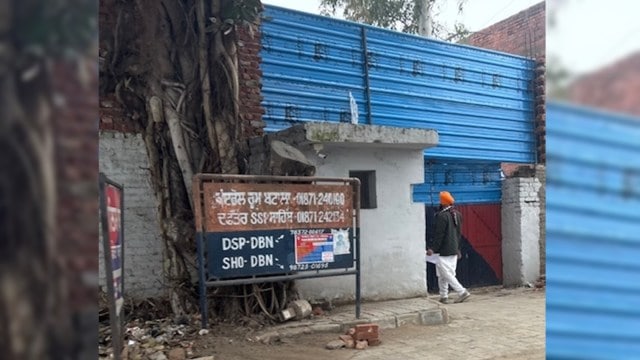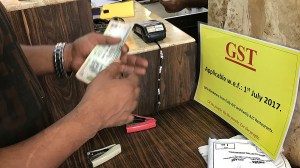Barbed wires, armoured tractors: Punjab fortifies border police stations
With most attacks having taken place after sunset in Amritsar and Gurdaspur districts, entry gates to most police stations and checkposts here are closed by 10 pm now, while approach roads at some others have been barricaded, affecting public access and movement.
 A police station fortified with blue corrugated metal sheets in Gurdaspur district. (Express photo by Man Aman Singh Chhina)
A police station fortified with blue corrugated metal sheets in Gurdaspur district. (Express photo by Man Aman Singh Chhina)Corrugated metal sheets, barbed wires, nets along the boundary walls, armoured tractors, new sentry posts and checkposts — police stations along Punjab’s two border districts are leaving nothing to chance in the face of multiple grenade attacks by suspected militants since December 2024.
With most attacks having taken place after sunset in Amritsar and Gurdaspur districts, entry gates to most police stations and checkposts here are closed by 10 pm now, while approach roads at some others have been barricaded, affecting public access and movement.
Since December 20 last year, 12 grenades have been thrown at police stations, police posts and even the residence of a man related to a police officer in these two districts. Although no injuries have been reported so far, operatives of two banned outfits — the Babbar Khalsa International (BKI) and Khalistan Zindabad Force (KZF) — have claimed responsibility for these attacks.
To a question on the police intelligence wing’s failure to pre-empt these attacks, DGP Gaurav Yadav said at a recent press conference in Chandigarh, “Pakistan’s nefarious designs in Punjab have to be defeated resolutely. We are sitting on the border with a neighbouring country (Pakistan) whose intelligence agency (ISI) considers Punjab a fertile ground (for terror activities). They want to bleed India by a thousand cuts.”
Claiming that these grenade attacks were being carried out to “spread the narrative that Punjab was unsafe”, the DGP said, “We are determined to crush this narrative and want to emphasise that Punjab is safe.”
Stating that those behind the grenade attacks have been “traced in a very scientific manner using CCTV footage and mobile tower call detail dumps”, Yadav said, “I don’t want to give the masterminds any importance by taking their names publicly. The masterminds sitting abroad and managing these activities belong to these two (border) districts. The foot soldiers used to carry out these attacks mostly live within a 25-km radius of the spots targeted.”
The first attack was reported around 9.30 pm on December 20, 2024, when unidentified persons lobbed a grenade at the Wadala Bangar police post in Gurdaspur district. On February 3 this year, unidentified persons threw a grenade at the Fatehgarh Churian police post in Amritsar district, marking the 10th such attack on police facilities in the state in 70 days.
However, these attacks were not limited to just police posts. On February 17, police received information about a low-intensity explosion at the residence of Sukhdev Singh in Dera Baba Nanak’s Raimal village, located around 7 km from the border. Police believe the intended target was Sukhdev’s relative Jatinder, a policeman stationed at Ramdas police station.
In Dera Baba Nanak, a small town in Gurdaspur district, an armoured tractor or a “bunker tractor” stands guard outside the police station. Locals say it has revived memories of the late 1980s, when K P S Gill took charge as the DGP when militancy was at its peak in the border state.
Visible behind the “bunker tractor” is a tall layer of red bricks used to raise the height of the existing boundary wall, which was already nearly 8 feet high. The resultant gap over the existing entry gate has been covered with blue corrugated sheets to prevent anything from being thrown inside.
In the adjoining Qila Lal Singh village, barbed wires have been used to barricade the approach road to the police station, forcing visitors to negotiate a narrow ingress to enter the premises.
In Amritsar city, tall green nets have been installed around the boundary walls of police establishments to “make it more difficult for someone to throw anything from outside into the police buildings”.
Stating that all previous attacks in his district had been solved, Batala Senior Superintendent of Police P Suhail Qasim Mir said he expects the perpetrators of the February 17 incident to be identified soon. “We have initiated the process for the issue of red corner notices so we can get gangsters based abroad extradited to India,” he said.
Dismissing criticism of the recent security upgrades, Mir said, “Police establishments were attacked. We cannot sit back and do nothing. In fact, hardening of security at police stations, raising the height of walls, etc., is mandated by the Bureau of Police Research and Development (set up in 1970 to identify the needs of the police).”
Security measures have been beefed up at police stations visited by The Indian Express across Amritsar and Gurdaspur districts.
While a tall net was already in place at a police checkpost on Amritsar’s Airport Road when it was attacked on January 9, to “protect” the city’s Vijay Nagar checkpost, located near a flyover, view cutters have been installed on the bridge. Provoking the ire of the locals, who say it “poses an accident risk”, a police car has also been permanently stationed on the flyover to keep a watch on the checkpost.
In the posh Ranjit Avenue area, traffic has been diverted at the main chowk to limit access to the police station, besides the installation of barriers. At Gharinda police station under Amritsar Rural Police, extra floodlights have been installed and deployment increased.
Even as senior Punjab Police officers say the extra security measures reflect a broader strategy to counter rising threats, including suspected terrorist activities, and to ensure the safety of police personnel and infrastructure, Satpal Singh, Station House Officer, Dera Baba Nanak Police Station, denied their link to the grenade incidents.
“The height of boundary walls was increased to deter anyone being held in the police station from escaping. The walls were too low earlier and one could easily climb over them,” he said.
Meanwhile, criticising the local police, Sukhjinder Singh Randhawa, the Gurdaspur MP who belongs to Dera Baba Nanak, said, “The approach road to Dera Baba Nanak police station is closed to traffic at night, forcing the locals to take a long way. The high walls, barbed wires, etc., are hardly deterrents for miscreants, who continue to throw grenades in houses belonging to individuals. To the general public, it seems the police are more concerned about their own safety than the common man’s.”
Terming the grenade attacks as “ominous”, Ravi Pandit, a BJP leader based in Dera Baba Nanak, alleged, “There is hardly a businessman in this area who has not received extortion calls. Some have been shot at. The current law and order situation in Punjab is similar to that in the 1980s.”
Stating that metal sheets had been installed “for the personal safety of the personnel” at police stations in Tarn Taran as well, J S Dhillon, former president of the Tarn Taran District Bar Association, said, “Police personnel are humans, just like us. That said, how can we feel secure if they feel unsafe?”







